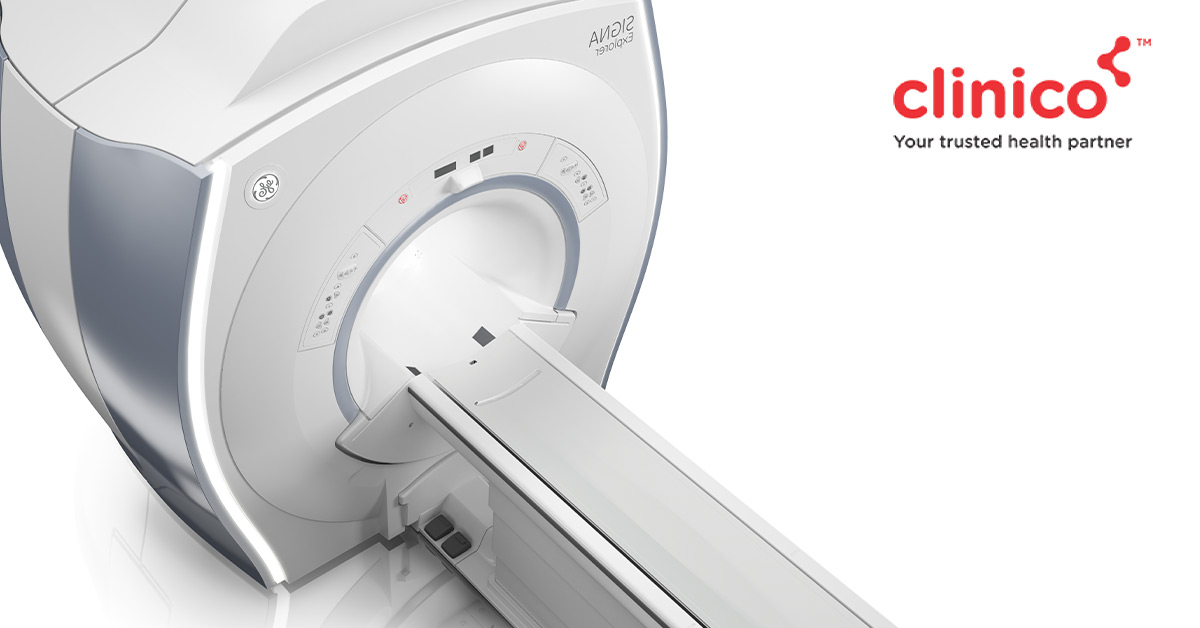
Has your doctor advised you to get an MRI Scan done?
This blog will provide you with all the essential information you need to know about MRI including its procedure, types, when to get it done, preparation, etc.
What is MRI Scan?
A common diagnostic technique worldwide, Magnetic Resonance Imaging (MRI) scan involves utilising strong magnetic fields & radio waves to generate images of the organs and tissues in the body.
Doctors then examine these images/results to help diagnose health conditions, chalk out treatment procedures & determine the effectiveness of prior treatments.
MRI Scan is generally used to examine the following body parts:
- Brain & Spinal Cord
- Bones & Joints
- Breasts
- Heart & Blood Vessels
- Internal organs, like the liver, womb or prostate gland
Procedure of MRI Scan
To begin with, an MRI Scan usually lasts for 15 to 90 minutes, depending on the extent of the area being scanned and the number of images being taken.
The MRI Scanner looks like a big tube with a flat bed/table in the middle, which allows the patient being scanned to slide in.
Keeping in mind the body part to be scanned, the patient is moved into the scanner in a head first or feet first position.The scanner is operated through a computer by a qualified radiographer, who is adept at conducting imaging investigations.
In particular instances during the scan, the scanner may make loud tapping noises. Hence, the patient being scanned is usually provided headphones or earplugs before the scan.
Once the required amount of images are taken, the scan comes to an end.
Types of MRI Scans
There are many different types of MRI Scans that are employed for various diagnostic purposes.
- Here are the most common types of MRI Scans:
- Functional MRI (fMRI)
- Cardiac MRI
- Breast scans
- Magnetic Resonance Angiography (MRA)
- Magnetic Resonance Venography (MRV)
- MR Spectroscopy
- MR Urography
- MR CP
When should someone do an MRI Scan?
An MRI Scan may be necessary if a person has been experiencing symptoms and a doctor is diagnosing the health condition.
The doctor will require detailed images of the internal organs & tissues of the person to help identify the health condition,
Moreover, an MRI may also be required to monitor the positive effects of an ongoing treatment on an existing illness or injury.
Necessary things to do before an MRI Scan
Generally speaking, there is little to no preparation required prior to an MRI Scan except while performing MRCP. For MRCP overnight fasting is required
The patient to be scanned is provided with a gown by the diagnostic centre or hospital, which needs to be worn during the scanning procedure.
As the scan involves the usage of magnets, the patient is asked to remove any metal accessories they may be wearing. Hence, it’s well-advised to keep all your jewellery or accessories at home.
The patient will then be asked whether they have claustrophobia (an anxiety disorder that causes an intense fear of enclosed spaces). Patients with claustrophobia are given medication to help ensure they feel comfortable during the scan.
Additionally, patients may sometimes be given an injection of intravenous (IV) contrast liquid to enhance the visibility of a specific tissue that is important to the scan.
Conclusion
To conclude, there is minimal preparation required before an MRI Scan. You can speak with the doctor or radiographer for detailed information regarding your particular MRI Scan.
If you are looking to get your MRI done in Mulund, Bhandup, Thane or Airoli area, you need to look no further than Clinico!
We are among the highly rated Diagnostic Centre and NABL Accredited Pathology Lab offering convenient, reliable and accurate pathology & diagnostic services to our customers.
Schedule Your MRI Today! Contact us 24×7 on 9504555555.
FAQ’s
Hiding any pre-existing health conditions from the technicians/ doctors and wearing any metal accessories are two things one must avoid before an MRI scan.
If you are going to undergo Magnetic Resonance Cholangiopancreatography (MRCP), which is a special type of MRI scan, then overnight fasting is necessary the day before the scan. Please contact the front office desk for more information
A pelvic or abdominal MRI scan requires fasting (no food & water consumption) for a minimum of 5 hours before the scan to ensure accurate test results. In most other MRI scans, no fasting is necessary.
Moonen, Chrit TW, and Peter A. Bandettini. Functional mri. Berlin: Springer, 2000.
https://link.springer.com/book/9783642587177
Graves, M. J. “”Magnetic resonance angiography.”” The British Journal of Radiology 70.829 (1997): 6-28.
https://www.birpublications.org/doi/abs/10.1259/bjr.70.829.9059290
Barker, Peter B., et al. Clinical MR spectroscopy: techniques and applications. Cambridge University Press, 2010.https://books.google.com/books?hl=en&lr=&id=gX2hYNyBYJgC&oi=fnd&pg=PP9&dq=MR+Spectroscopy&ots=cp8M4Tv_Ea&sig=BrsS690xaZbGyQAlqYKXdighuEQ
Leyendecker, John R., Craig E. Barnes, and Ronald J. Zagoria. “”MR urography: techniques and clinical applications.”” Radiographics 28.1 (2008): 23-46.https://www.researchgate.net/profile/Ronald-Zagoria/publication/5647545_MR_Urography_Techniques_and_Clinical_Applications1/links/5653664008ae1ef929760312/MR-Urography-Techniques-and-Clinical-Applications1.pdf
Kilborn, L. Christine, and Elise E. Labbé. “”Magnetic resonance imaging scanning procedures: development of phobic response during scan and at one-month follow-up.”” Journal of Behavioral Medicine 13.4 (1990): 391-401.https://link.springer.com/article/10.1007/BF00844886


